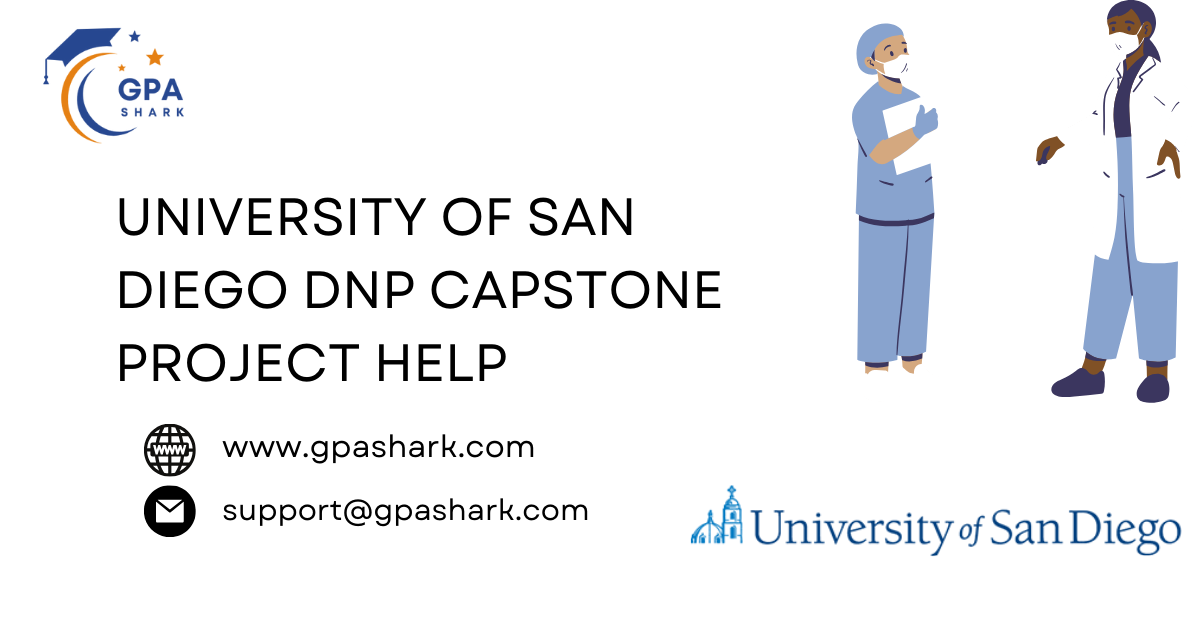The University of San Diego (USD) Doctor of Nursing Practice (DNP) program is designed to prepare advanced practice nurses to excel in clinical practice, leadership, and healthcare innovation. Recognized by US News and World Report, this prestigious program equips students with the skills and knowledge necessary to meet the complex demands of the healthcare environment.
Table of Contents
Below are the key outcomes of the USD DNP program:
University Of San Diego DNP Outcomes
Advanced Clinical Practice
Graduates demonstrate advanced levels of clinical practice within defined ethical, legal, and regulatory parameters. They are proficient in designing, implementing, and evaluating evidence-based, culturally competent therapeutic interventions for individuals and groups. This ensures that they can provide high-quality care that respects the diverse needs of their patients.
Theoretical and Ethical Foundations
Students synthesize nursing and other scientific and ethical theories and concepts to create a robust foundation for advanced nursing practice. This interdisciplinary approach ensures that graduates can integrate various perspectives into their practice, enhancing patient outcomes and advancing the field of nursing.
Leadership and Policy Development
Graduates demonstrate leadership in collaborative efforts to develop and implement policies aimed at improving healthcare delivery and outcomes. They work at multiple levels of professional practice, including institutional, local, state, regional, national, and international arenas, to influence and shape healthcare policies that promote better health outcomes.
Research Integration
Incorporating research into practice is a critical component of the DNP program. Graduates engage in critical appraisal of existing evidence, evaluate practice outcomes, and develop practice-based guidelines. This evidence-based approach ensures that their practice remains current and effective in addressing healthcare challenges.
Healthcare and Information Systems
Graduates design, implement, and evaluate healthcare delivery systems and information systems that meet societal needs and ensure accountability for quality outcomes. This skill set is crucial for developing systems that enhance patient care and improve operational efficiency within healthcare organizations.
Population Health Focus
Employing a population health focus, graduates design, implement, and evaluate healthcare delivery systems that address primary, secondary, and tertiary levels of prevention. This approach ensures that healthcare interventions are comprehensive and address the broader determinants of health, leading to improved community health outcomes.
Ethical, Regulatory, and Legal Guidelines
Graduates incorporate ethical, regulatory, and legal guidelines in the delivery of healthcare and the selection, use, and evaluation of information systems and patient care technology. This ensures that their practice not only meets professional standards but also upholds the highest ethical and legal standards.
Key Units in the USD DNP Program
The USD DNP program includes a comprehensive curriculum designed to cover all essential aspects of advanced nursing practice. Key units include:
- DNPC 610 Philosophy of Reflective Practice: This unit explores the philosophical foundations of reflective practice and its application in clinical settings.
- DNPC 611 Methods of Translational Science/Evidence-Based Clinical Practice: Students learn about methods to translate research into practice, emphasizing evidence-based clinical decision-making.
- DNPC 625 Epidemiology: Foundations of Evidence-Based Practice: This unit provides an understanding of epidemiological principles and their application in evidence-based practice.
- DNPC 626 Strategic Planning and Quality Initiatives: Focuses on strategic planning and the implementation of quality initiatives in healthcare settings.
- DNPC 648 Health Policy Analysis: Students analyze health policies and their impact on healthcare delivery and outcomes.
- DNPC 660 Advanced Leadership and Financial Decision Making for Complex Systems Management: Covers advanced leadership strategies and financial decision-making in managing complex healthcare systems.
- DNPC 665 Consumer Health Informatics: This unit explores the role of informatics in enhancing consumer health and healthcare delivery.
- DNPC 686 Perspectives in Program Planning and Evaluation: Students learn about different perspectives and approaches to program planning and evaluation in healthcare.
- DNPC 630 DNP Scholarly Practice: Provides opportunities for students to engage in scholarly practice projects that integrate their learning and advance nursing practice.
The USD DNP program prepares nurses to be leaders and innovators in the healthcare field, ensuring they are equipped to meet the evolving needs of the healthcare environment.
About University of San Diego DNP Program
The University of San Diego (USD) Doctor of Nursing Practice (DNP) program is designed to prepare nurses for the highest level of clinical practice and leadership in the healthcare field. This rigorous program offers a comprehensive curriculum and a variety of specialized tracks to meet the diverse needs of nursing professionals. Here’s an overview of the program, including the different tracks available.
BSN to DNP
The USD DNP program offers a BSN to DNP pathway, allowing registered nurses with a Bachelor of Science in Nursing (BSN) to pursue a Doctor of Nursing Practice degree. This pathway is designed to build on the foundational knowledge of BSN-prepared nurses, advancing their clinical skills, leadership abilities, and knowledge of healthcare systems.
Program Tracks
The USD DNP program includes several specialized tracks, allowing students to focus on specific areas of interest and expertise. The available tracks are:
Family Nurse Practitioner (FNP)
This track prepares nurses to provide comprehensive primary care to individuals and families across the lifespan. FNPs are trained to diagnose and treat a wide range of conditions, emphasizing health promotion and disease prevention.
Family Nurse Practitioner in Emergency Care
This specialized track focuses on preparing FNPs to work in emergency care settings. Nurses in this track are trained to handle acute and urgent medical conditions, providing high-quality care in fast-paced environments.
Dual Adult Gerontology/Family Nurse Practitioner
This dual track equips nurses with the skills to care for both adults and the elderly. It combines the knowledge and competencies of adult gerontology and family nurse practice, ensuring graduates can meet the complex needs of these populations.
Dual Pediatric/Family Nurse Practitioner
This dual track prepares nurses to provide primary care to both children and families. It integrates pediatric and family nurse practitioner training, enabling graduates to deliver holistic care to patients of all ages.
Psychiatric-Mental Health Nurse Practitioner
This track focuses on mental health care, preparing nurses to assess, diagnose, and treat psychiatric disorders. Graduates are equipped to provide therapy, prescribe medications, and promote mental health and wellness.
Health Systems Leadership
The health systems leadership track is designed for nurses aiming to take on executive and administrative roles in healthcare organizations. It covers strategic planning, quality improvement, and leadership principles essential for managing complex healthcare systems.
Nursing Informatics and Data Science
This track focuses on the intersection of nursing, information technology, and data science. Nurses are trained to leverage technology and data to improve patient care, enhance healthcare delivery, and support decision-making processes.
How to Pass the University of San Diego DNP Program
The University of San Diego’s Doctor of Nursing Practice (DNP) program is challenging and requires dedication and effective strategies to succeed. Here are five key tips to help you pass the program:
1. Master the Curriculum
Understanding the curriculum is essential. Familiarize yourself with key units such as:
- DNPC 610 Philosophy of Reflective Practice
- DNPC 611 Methods of Translational Science/Evidence-Based Clinical Practice
- DNPC 625 Epidemiology: Foundations of Evidence-Based Practice
- DNPC 626 Strategic Planning and Quality Initiatives
- DNPC 648 Health Policy Analysis
- DNPC 660 Advanced Leadership and Financial Decision Making for Complex Systems Management
- DNPC 665 Consumer Health Informatics
- DNPC 686 Perspectives in Program Planning and Evaluation
- DNPC 630 DNP Scholarly Practice
Having a clear understanding of these courses will help you plan your studies and prioritize your workload effectively.
2. Develop Strong Study Habits
Create a consistent study schedule and stick to it. Break down large tasks into manageable parts and set deadlines for each. Utilize study aids like flashcards, summaries, and practice questions to reinforce your learning. Joining study groups can also provide mutual support and accountability.
3. Enhance Leadership and Research Skills
Courses like DNPC 660 and DNPC 611 emphasize leadership and research. Actively engage in these courses to develop your skills. Stay current with the latest research in nursing and healthcare by reading journals and attending conferences. This will enhance your evidence-based practice and leadership abilities.
4. Utilize University Resources
Take advantage of the resources offered by USD, such as academic advising, tutoring services, and writing centers. These resources can provide valuable support in study techniques, assignment preparation, and exam strategies. Additionally, seek feedback from your instructors and peers to identify areas for improvement.
5. Seek Capstone Help from GPAShark.com
The DNP capstone project is a significant part of the program. To ensure success, consider getting professional assistance. Get University of San Diego DNP capstone help from GPAShark.com. Their expert guidance can help you navigate the complexities of your capstone project, ensuring it meets all requirements and stands out.
FAQs About the University of San Diego DNP Program
What are the admission requirements for the University of San Diego DNP program?
To apply for the University of San Diego DNP program, you need a BSN or MSN from an accredited institution, a minimum GPA of 3.0, a current RN license, and relevant clinical experience. Additionally, you must submit a personal statement, professional references, and a resume. Some tracks may have specific prerequisites.
What specializations are offered in the University of San Diego DNP program?
The University of San Diego DNP program offers several specialized tracks, including:
Family Nurse Practitioner (FNP)
Family Nurse Practitioner in Emergency Care
Dual Adult Gerontology/Family Nurse Practitioner
Dual Pediatric/Family Nurse Practitioner
Psychiatric-Mental Health Nurse Practitioner
Health Systems Leadership
Nursing Informatics and Data Science
How long does it take to complete the University of San Diego DNP program?
The duration of the University of San Diego DNP program varies depending on the chosen track and whether you are studying full-time or part-time. Generally, the BSN to DNP pathway can be completed in three to four years of full-time study, while part-time options may take longer.
What is the focus of the University of San Diego DNP program’s curriculum?
The University of San Diego DNP program’s curriculum emphasizes advanced clinical practice, leadership, evidence-based practice, and healthcare systems improvement. Key units include courses on reflective practice, translational science, epidemiology, health policy analysis, leadership, informatics, and program planning and evaluation.
Can I get help with my DNP capstone project at the University of San Diego?
Yes, the University of San Diego offers resources to help students with their DNP capstone projects. Additionally, external support is available. You can get University of San Diego DNP capstone help from GPAShark.com, which provides expert guidance to ensure your project meets all academic requirements.
Doctor of Nursing Practice (DNPC) Courses
- Must Read:
- University of San Diego DNP Capstone Project Help
- DNPC 610 Philosophy of Reflective Practice
- DNPC 611 Methods of Translational Science/ Evidence Based Clinical Practice
- DNPC 622 Pathogenesis of Complex Disease
- DNPC 625 Epidemiology: Foundations of Evidence-Based Practice
- DNPC 626 Strategic Planning and Quality Initiatives
- DNPC 648 Health Policy Analysis
- DNPC 660 Advanced Leadership and Financial Decision Making for Complex Systems Management
- DNPC 665 Consumer Health Informatics
- DNPC 686 Perspectives in Program Planning and Evaluation
- DNPC 630 DNP Scholarly Practice

